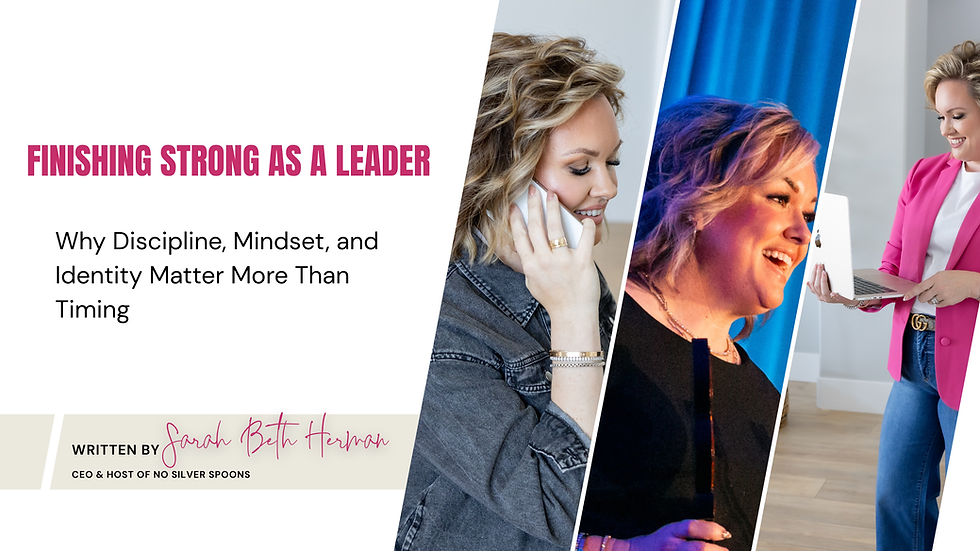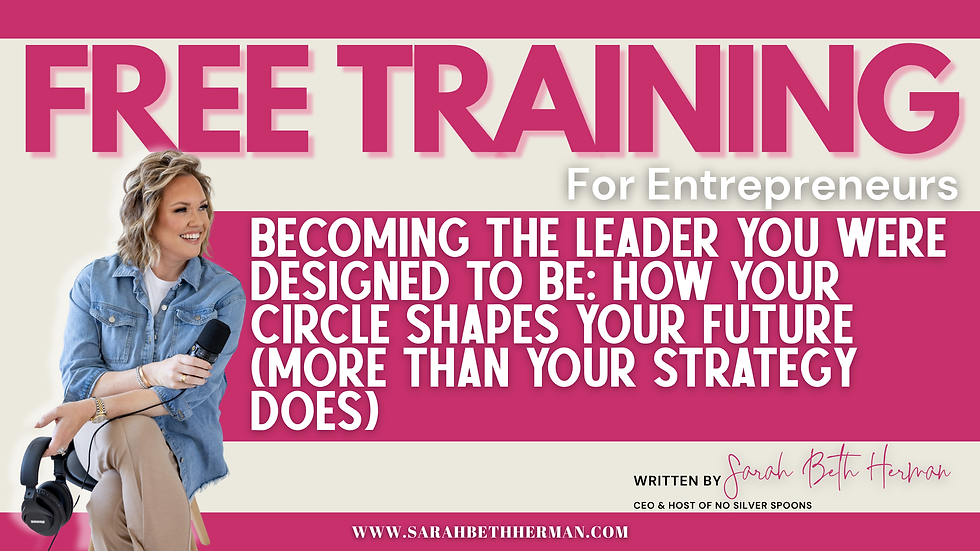How Passive Mindsets Keep You Broke, Bitter, and Stuck Where You Don’t Belong
- Sarah Beth Herman

- Jun 12, 2025
- 4 min read
Updated: Jun 13, 2025

There’s a reason your vision board hasn’t turned into reality yet. And it’s not because you’re not working hard enough, smart enough, or deserving. It’s because you’re still clinging to habits that feel familiar—habits that quietly tell you it’s fine to stay where you are. That’s the danger of a passive mindset. It’s quiet. It’s polite. And it’s keeping you broke. If you’ve been feeling stuck, tired, overwhelmed, or like you’re constantly trying to fake confidence, this is for you.
This free training is based on Episode 72 of No Silver Spoons—Positive on Purpose: Why Passive Mindsets Keep You Broke and Bitter. It’s not a motivational pep talk. It’s a hard truth conversation about the difference between choosing progress and avoiding your own potential.
Let’s talk about what’s really going on—and how to take your power back.
What Passive Actually Looks Like (And Why It’s Sneaky)
Most people think “passive” means lazy. But passivity wears a lot of disguises:
“I’m waiting for the right time.”
“It’s not perfect yet.”
“I don’t want to make the wrong move.”
The truth is, passivity is often fear in disguise. A 2022 study from McKinsey & Company found that 72% of small business owners cited fear of failure as the main reason they delayed taking action—even when they had resources, money, and time (McKinsey & Company, 2022). That’s not a coincidence. It’s a mindset epidemic. Waiting until you feel ready will waste your best years.
The Lie of “Fake It Till You Make It”
You’ve heard this phrase a thousand times. And if we’re being honest, you’ve probably used it as a survival tool.
But according to the American Psychological Association, this kind of “surface acting”—pretending to feel something you don’t—leads to increased burnout, anxiety, and decreased performance (APA, 2020). When you fake it long enough, you lose touch with who you actually are.
The opposite of “fake it” isn’t falling apart. It’s walking in integrity. It’s building something that reflects your values, not your fears. Confidence doesn’t come from pretending. It comes from choosing to show up even when the results don’t look like much yet.
Positivity Isn’t Weak—It’s Weaponized
Being positive isn’t about ignoring pain or pretending life is fine when it’s not. It’s about choosing how you move through it. And choosing what you build from it.
Dr. Barbara Fredrickson’s Broaden-and-Build Theory proves that positivity actually changes your brain’s capacity to see possibilities and take action. Her research shows that people who lead with positive emotion build better relationships, create more solutions, and are more resilient in the face of pressure (Fredrickson, 2001). In other words, positivity isn’t fluff. It’s fuel.
The Scroll Trap and Why It’s Crushing Your Self-Worth
Comparison is one of the fastest ways to kill momentum. Studies show that more than 30 minutes per day on curated, performative social feeds directly increases anxiety and lowers self-esteem (Twenge & Campbell, 2018). So while you’re busy scrolling for inspiration, your brain is being fed unrealistic expectations and invisible timelines.
Protect your peace like it’s your password. Not everyone deserves access to your energy.
Five Action Steps to Shift Out of Passivity
This training isn’t just meant to make you think. It’s meant to get you moving. Here are five steps you can take right now to start shifting out of passive habits and into intentional action:
Write a New Core Belief
Example: “Even when it’s hard, I choose to see opportunity.” Say it. Post it. Share it.
Audit Your Feed
Mute or block five accounts that trigger comparison, pressure, or shame. You’re not being rude. You’re being responsible.
Anchor Your Mindset Daily
Journal three things you’re grateful for and one challenge you’re facing with strength.
Speak Your Truth—Even If Only to Yourself
Say what you want out loud. Let your voice hear that you believe in your vision.
Commit to One Intentional Habit for 30 Days
Read instead of scroll. Walk instead of complain. Speak up instead of shrink.
You Don’t Need a Perfect Plan. You Need a Better Mindset.
You weren’t handed a silver spoon. That’s the whole point. But that doesn’t mean you weren’t born to build something powerful. Passive behavior may feel safe, but it will never satisfy. This is your moment to get real, get gritty, and get serious about where you’re going.
This episode will walk you through every single concept we talked about above, with real-world examples, science, and strategy.
🎧 Listen now to the full free training:
References
American Psychological Association. (2020). Surface acting and employee burnout: The emotional cost of pretending. Retrieved from https://www.apa.org/news/press/releases/stress/2020
Fredrickson, B. L. (2001). The role of positive emotions in positive psychology: The broaden-and-build theory of positive emotions. American Psychologist, 56(3), 218–226. https://doi.org/10.1037/0003-066X.56.3.218
McKinsey & Company. (2022). Fear of failure among entrepreneurs: The hidden barrier to growth. Retrieved from https://www.mckinsey.com/industries/public-and-social-sector/our-insights
Twenge, J. M., & Campbell, W. K. (2018). Associations between screen time and lower psychological well-being among children and adolescents: Evidence from a population-based study. Preventive Medicine Reports, 12, 271–283. https://doi.org/10.1016/j.pmedr.2018.10.003

Disclaimer: The information provided in this blog is for informational purposes only and does not constitute professional advice. Readers should consult with appropriate professionals for specific advice tailored to their circumstances. All efforts have been made to ensure the accuracy of information and references; however, errors may occur. If you notice any inaccuracies or would like to suggest updates, please contact us at hey@sarahbethherman.com. © 2025 Sarah Beth Herman. All Rights Reserved. By using this site, you agree to our Privacy Policy and Terms of Use. This post may contain affiliate links, and we may earn a commission at no extra cost to you if you make a purchase through them. References included where known. Please email hey@sarahbethherman.com to report missing attributions or inaccuracies.



Comments